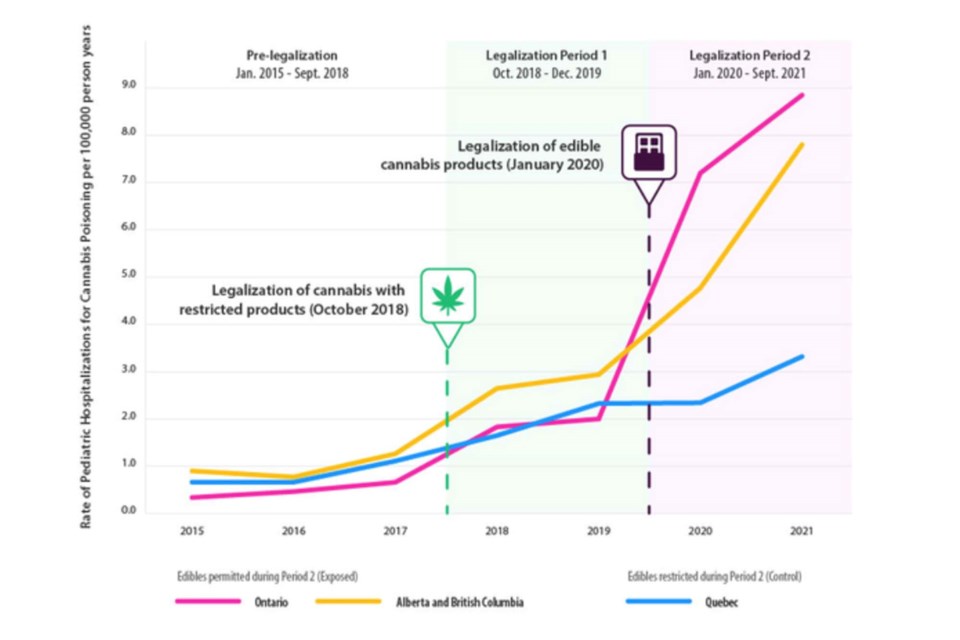A recent study of cannabis poisoning in children showed hospitalizations increased substantially after the legalization of edibles nearly two years ago.
The study, led by Dr. Daniel Myran, a family physician, public health and preventive medicine specialist and post-doctoral fellow at the University of Ottawa Department of Family Medicine and The Ottawa Hospital, was published on Aug. 24 in the New England Journal of Medicine. It looked at three provinces which had legalized edibles and compared them to a province that did not follow suit.
The study found the provinces — which included Ontario, Alberta, and British Columbia — which had legalized cannabis edibles in January 2020 had a hospitalization rate for cannabis poisonings that was 7.5 times higher than it was before cannabis legalization.
Quebec, which did not legalize cannabis edibles in January 2020, had a hospitalization three times higher than before legalization.
“Legalization was associated with marked increases in hospitalizations for cannabis poisoning in children. Most of the increase occurred after the legalization of cannabis edibles and despite strict regulations aimed at reducing poisonings in children, including a maximum of 10 mg of THC per edible package,” the study read.
Health records from the provinces were used to gather information on paediatric hospitalizations from January 2015 to September 2021.
During that time there were a total of 581 hospitalizations in the provinces studied, with the average age of hospitalized children at 3.6 years, and found that 53.9 per cent were boys.
Cannabis poisonings among youth can and do occur, said Dr. Chris Sikora, zone medical officer of health for Alberta Health Services, Edmonton zone.
“It happens because those ages are consuming often edibles ... which have not been adequately secured by adults or [they are in] environments where they shouldn't have access to them,” he said.
Kristi Bland, a spokesperson for Alberta Health Services, said in the Edmonton zone, which includes the Sturgeon Community Hospital, from Jan. 1, 2020, to May 31, 2022, in children ages zero to 14, there were 83 emergency care visits where cannabis poisoning was mentioned as a diagnosis.
Provincially there were 257 emergency care visits by children where cannabis poisoning was mentioned.
The Edmonton zone saw 20 cannabis poisoning hospitalizations for that age group in that same time period. Alberta wide, there were 51 hospitalizations.
There was a total of 46 calls to Health Link from Jan. 1, 2020, to May 31, 2022, in the Edmonton zone while the provincial total was 136.
Sikora said they could not break down the data for the Sturgeon Community Hospital, as small numbers don’t have to be “reported in aggregate.”
Poisoning events can be very concerning, said Sikora.
“Kids may become very, very sick,” he said.
Children can develop seizures, others can develop nausea and vomiting, or drowsiness.
“Some of those, especially young kids, can be very severe and [cannabis poisoning] can be life threatening. Accessing assistance and help through 811 utilized in our emergency departments are very appropriate mechanisms with that,” he said.
Sikora recommends prevention is the first and foremost step to stop kids from being poisoned with cannabis and that comes from making sure cannabis is in a safe, secure location kids can't access.
Cannabis consumption should be delayed for as long as possible, said Sikora, as the brain is developing until the age of up to 25.
“In terms of health effects of cannabis overall, long-term cannabis use can affect and harm your memory, concentration, your ability to make decisions, and ultimately your intelligence or IQ.
“The effects are worse if you start using early and frequently over a longer period of time. So, we always do recommend use as little as possible and delay as much as you can overall,” he said.



